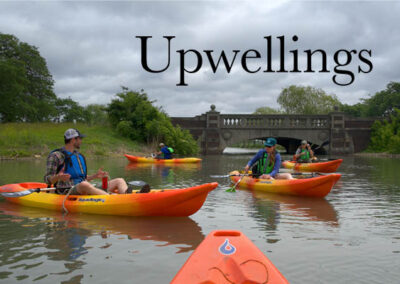
Over the past decade, local leaders in Au Gres have leveraged Michigan Sea Grant’s Sustainable Small Harbors project to make positive changes and fuel economic growth in their small coastal community.
The City of Au Gres is located along the Au Gres River, approximately two miles upstream from the outlet to Saginaw Bay in Lake Huron. Early in its history, Au Gres was considered a logging community. By the early 2010s, that industry had long faded, and local leaders were looking for new ways to drive community development and economic growth. They recognized the advantages of being linked to Lake Huron — Au Gres has been called the “perch capitol of Michigan” and is a highly regarded portal to Saginaw Bay’s walleye fishery and duck hunting. However, the community lacked safe, public access points to the Au Gres River, an important part of being able to ride the rising wave of interest in natural resources tourism.
In 2015, Au Gres leaders teamed up with the Michigan Sea Grant-funded Sustainable Small Harbors program for a series of community visioning workshops. These workshops helped residents and community leaders develop a plan to improve the city’s public waterfront access and enhance economic, social, and environmental sustainability.
The Sustainable Small Harbors program empowers communities to develop long-term, sustainable strategies to maximize the benefits of their harbor facilities to the community, in the face of uncertain environmental conditions and funding sources. The project has been primarily funded by Michigan Sea Grant and the Michigan Department of Environment, Great Lakes, and Energy.
Thanks to the visioning workshops and ongoing grant-writing support from Michigan Sea Grant, Au Gres leaders acquired the former state-managed harbor, opened it to the public as Riverside Park, upgraded site facilities, and managed stormwater with student-led green infrastructure projects. Au Gres has supported these improvements with state, tribal, and local grant funding.
Acquiring the former state-managed harbor enabled Au Gres to offer an improved waterfront access point for boaters, anglers, and other residents and visitors. Upgrades at Riverside Park included refurbishing existing infrastructure and adding a fish cleaning station, new splash pad and playscape, kayak launch, and barrier-free fishing pier.
With fresh momentum from Riverside Park, the city’s riverfront campground has expanded occupancy from around 4 seasonal sites in 2016 to 35 fully booked seasonal sites in 2023. There are also an additional 74 sites for short-term camping reservations and two mini-cabins. Plans for further expansion include additional seasonal sites, larger sites to accommodate longer vehicles, and more mini-cabins.
Working with the Huron Pines organization, Au Gres received grants from the Bay Area Community Foundation and Saginaw Bay Watershed Initiative Network to conduct a stormwater assessment in 2017. They identified multiple areas where rain gardens and bioswales — groupings of deep-rooted native plants — could capture and filter stormwater runoff from roads and parking lots. These installations are reducing flood risk and water pollution while adding greenspace to the community. Huron Pines and students at Au Gres-Sims School worked together to design and install a rain garden at Riverside Park in 2020. They’ve since planted two bioswales to capture road runoff along East Michigan Avenue, along with rain gardens in other locations.
The city further built their partnership with Huron Pines in 2022 when it became the first city to take the Lake Huron Forever Pledge, a commitment to manage stormwater runoff, invasive species, and chemical hazards for the wellbeing of shared Great Lakes waters.
For more information on Michigan Sea Grant’s Sustainable Harbors program, including the community-oriented Tools and Tactics Guidebook, visit: sustainablesmallharbors.org.
This article was prepared in cooperation with the Michigan Municipal League and Don Carpenter, PhD, PE, LEED, AP. He is vice president of Drummond Carpenter, an engineering and research firm, and served as the primary researcher for the Sustainable Small Harbors program. Contact him at [email protected].


